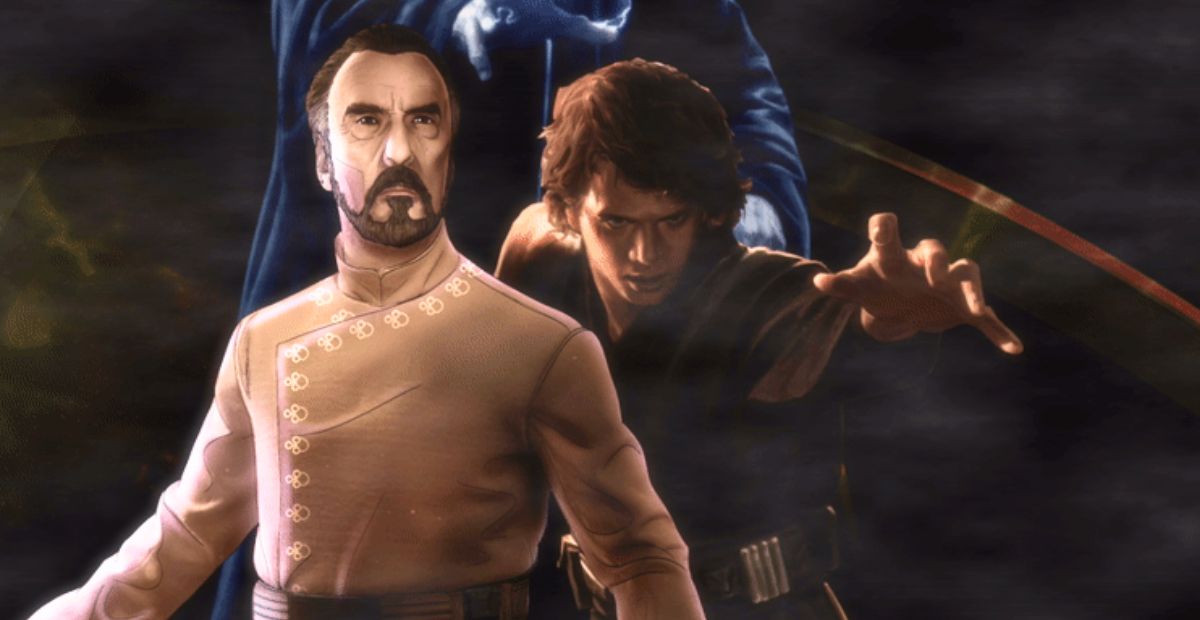Dooku and Anakin fell to the dark side because they felt betrayed by the Jedi. Yet, Dooku’s fall is more believable than Anakin’s. Why? Because Dooku had long-standing disillusionment, while Anakin’s descent felt too rushed.
Dooku’s Long Fall to the Dark Side
Dooku’s fall to the dark side was believable because it was based on a narrative of disillusionment with the Jedi Order. Dooku is framed as “a political idealist” who witnessed the corruption of the Senate and Republic. He also came to believe the Jedi were too plagued with “short-sightedness and obstinacy,” especially after the mission Galidraan left eleven Jedi dead.
The Jedi had been manipulated in the fight with the Mandalorians, and then Qui-Gon Jinn died at the hands of Darth Maul. Dooku partially blamed the Jedi council for Qui-Gon’s death and came to see the Sith as having a common goal of setting the galaxy on a new course. Meanwhile, Palpatine had been working his manipulations to draw Dooku to the dark side.
These events and others took time to develop, and Dooku’s descent was more believable because of the reasons and his long progression.
As this article conveys about Tales of the Jedi, Dooku’s fall had deep roots connected to disillusionment. Dooku stressed how the Force can be used to instill order in the galaxy, while the Jedi didn’t share this view. In essence, Dooku could have been imbibing the Sith code that fostered discord with the Jedi. That split materialized over “the Jedi Order’s inability to root out corruption in the Republic.”
This video coincides with this thinking as it briefly recaptures Dooku’s “turn from being trained by Yoda to the dark side” in Tales of the Jedi. Episode 2, “Justice,” exposed the political corruption angle when Dooku and Qui-Gon go to rescue a senator’s son but find out that the senator is in it for himself. Moreover, the following episode shows Dooku’s “frustrations with the Jedi Order itself” as Mace Windu gets rewarded for not wanting to investigate the murder of a Jedi.
To Dooku, the Senate and Jedi have merged into collusion for themselves and not for the benefit of the Republic and its people. What the Jedi have turned into was the long-term seed that grew inside Dooku and pushed him to the Sith.
Anakin’s Fall Felt Too Quick
While we can identify parallels between Dooku and Anakin’s fall to the dark side, the apparent brevity of Anakin’s fall was what distinguished them. That quick fall made Anakin’s story less believable.
As fans attest to on this discussion, “Anakin’s fall felt too quick” by the way “he became a mass murderer overnight.” That is, the killing of younglings was “too sudden.” In comparison, Dooku “spent his whole life serving” an Order that was “actually full of corruption and ignorance.” Anakin’s main motivation was really about saving Padme.
Although we may find this personal devotion believable, this reason tends to push Anakin on the fast track to the dark side. True, Anakin had his own discord with the Jedi at first rejecting him from the order and then not allowing him to become a Master. We certainly can recognize the underlying distrust of Anakin “from his superiors, particularly Mace Windu” that prevented his advancement and fed into his path to the dark side.
Yet, we only have hints of that in the movies and a seemingly childish response from Anakin. The Clone Wars depicted more of Anakin’s growing anger and isolation within the Order. Still, we only have glimpses, as in Season 7, Episode 4, when a more visible shift.
What we tend to walk away with, though, is how Anakin fell into the dark side to save what he cherished most, especially Padme. A fan here explains it well: Anakin got “attached to things” and could not “let go of his mother” or Padme. The dark side climbed inside him in a “greedy” way and drove his fear of losing those close to him. Fair enough, but it conveys a sense of helplessness and rapid downfall.
We may think that Anakin’s fall to the dark side is more believable if he had ulterior motives. That is, we can see how he was planning from the start to overthrow Palpatine, as he indicated to Padme. Palpatine was thus “a means to an end.” Yet, that rationale also feels rushed, like Anakin was seizing on any possibility to save Padme.
Dooku’s Fall is More Believable
Because of the sense of Dooku’s genuine long-term grievances with the Jedi and Senate, his downfall is more believable. We don’t even get to see his turn in the movies, but because of its exploration in Legends and Tales of the Jedi, his disillusionment narrative feels more effective. Anakin’s fall has its merits, but in comparison it feels rushed and primarily for personal reasons.

